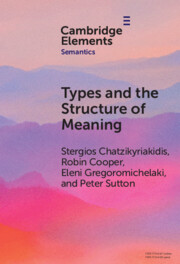Refine search
Actions for selected content:
1 results

Types and the Structure of Meaning
- Issues in Compositional and Lexical Semantics
-
- Published online:
- 12 May 2025
- Print publication:
- 05 June 2025
-
- Element
-
- You have access
- Open access
- HTML
- Export citation
